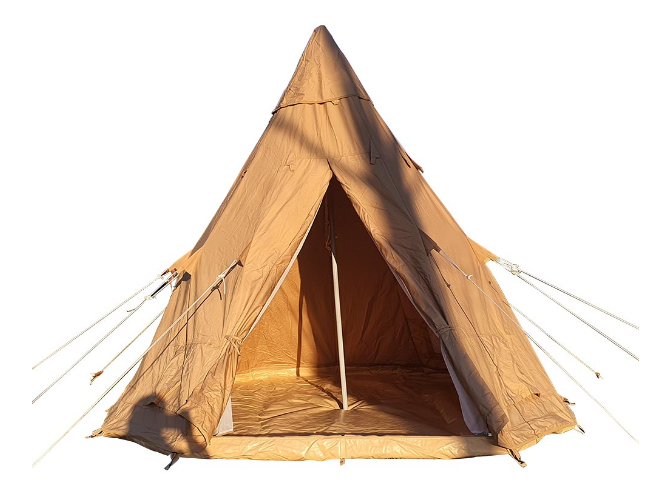Pros and Cons of Different Tent Fabrics at a Tent Sale
Polyester, Silnylon, DCF or Cuben fiber, Polycotton canvas, and PE—are you feeling overwhelmed by the array of tent fabrics available? Understanding the characteristics of these fabrics can guide you in making the right choice when browsing tents for sale. With various fabrics, coatings, and specifications to consider, it's easy to get confused. Below, we outline the pros and cons of the most common tent fabrics, along with their ideal uses. Alternatively, you can explore our article for further insights into tent fabric specifications and coatings.
Polyester:
Pros – Offers good strength, stretch, and tear resistance; easy to maintain; reasonably lightweight and cost-effective; compact pack size; exhibits good mildew resistance; becomes waterproof when coated
Cons – Lacks excellent UV resistance and heat resistance; low breathability leading to condensation; has a limited lifespan
Great for – Small and large dome tents, family camping tents and shelters, camping tarps
Polyester stands out as the most commonly used fabric in tents. Its popularity stems from its versatility in various weather conditions and affordability. Polyester retains its shape when wet, becomes waterproof with coating, holds up reasonably well in sunlight, boasts better durability than nylon, maintains a manageable weight, and packs down relatively small.

Nylon:
Pros – Very lightweight; offers good strength; waterproof when coated; easy to maintain; compact packed volume
Cons – Higher cost; stretches when wet; susceptible to UV damage; lacks breathability; prone to tearing
Great for – Ultralight and lightweight tents, tarps
Nylon is typically stronger and lighter than polyester, making it ideal for ultralight and lightweight tents as well as tarps. However, it can tear easily, so opting for Ripstop fabric is advisable. While nylon must be coated with Silicone (thus silnylon) and/or PU to achieve waterproofing, it remains vulnerable to UV exposure, necessitating limited direct sunlight exposure to preserve its integrity.
Dyneema Composite Fiber (DCF) / formerly Cuben Fiber:
Pros – Extremely lightweight; exceptionally strong; waterproof; excellent UV, tear, and chemical resistance
Cons – Very expensive; does not stuff (needs to be folded); lacks stretch; low heat resistance
Great for - Ultralight tents, tarps
DCF stands out as the ultimate lightweight tent fabric, comprising Dyneema fibers (15 times stronger than steel of the same weight) enclosed in a polyester film. It's unparalleled in terms of weight, strength, and durability, but also comes with a significantly higher price tag. Weighing less than half of silnylon, it costs four times as much, offers waterproof properties, and does not absorb water. However, DCF lacks elasticity, requiring careful handling during pitching to prevent punctures and ensure proper shaping. Notably, it is not heat resistant, so cooking under it should be avoided. DCF is often hailed as the 'miracle fabric' among ultralight enthusiasts, albeit at a premium price.
Cotton Canvas:
Pros – Breathable; moisture absorbent; reduces condensation; provides good insulation (cool in summer, warm in winter); durable; high UV resistance
Cons – Expensive; heavy; bulky; susceptible to mildew; requires weathering before initial use; necessitates regular maintenance
Great for – Cabin-style family tents, glamping setups, bell tents, extended camping trips, swags
Cotton canvas is the original tent fabric your grandad probably used - thick, durable, breathable, expands and swells when wet to seal off any holes. May leak the first time in rain as the swelling process takes place so needs to be weathered/seasoned before being used. Canvas is heavy and bulky and requires a lot of effort pitching and transporting.
Polycotton Canvas:
Pros – Offers better strength and mildew resistance than cotton canvas; superior resistance to UV and heat compared to polyester; breathable, reducing moisture and condensation; longer lifespan and better weight than traditional cotton canvas
Cons – High cost; requires careful maintenance; still susceptible to mildew; bulky
Great for – Family tents, cabins, rooftop tents, swags, glamping setups
Polycotton is a blend of cotton canvas and polyester, resulting in a lighter yet stronger canvas material. While it can be left uncoated, it's typically treated with coatings to enhance water repellency and improve resistance to mold and mildew. Its combination of durability, breathability, and weather resistance make it ideal for a variety of uses including family camping tents, swags, and rooftop tents.
PE (Polyethylene):
Pros – Tough, durable, waterproof, inexpensive
Cons – Bulky, noisy, non-breathable
Great for – Dome and family tent floors, tarps
PE, or Polyethylene, is typically black or grey and resembles a thick, durable plastic material commonly used for tarps and tent floors. Its affordability, durability, waterproof nature, and ease of cleaning make it ideal for tent floors. However, it may be bulky, emit noise when moved, and lack breathability.
PVC (Polyvinyl Chloride):
Pros – Strong and durable; good UV resistance
Cons – Heavy and bulky
Great for – Heavy-duty tent floors, heavy-duty tarps, awnings, and tent roof covers
Heavy-duty PVC is employed to withstand rugged environmental conditions, particularly for areas with heavy foot traffic. While it offers toughness and durability, it tends to be heavy and bulky. PVC is commonly used alongside canvas tents.
Mesh:
Mesh netting of various strengths and thicknesses is utilized for inner tent walls to keep insects out. Windows and doors often feature lightweight mesh layers providing protection from bugs, improving ventilation, and reducing internal condensation.
It's important to note that the performance and quality of these fabrics may vary depending on their specifications and applied coatings. If you have any questions, feel free to contact us at Sunday Campers, and we'll do our best to assist you.



Comments